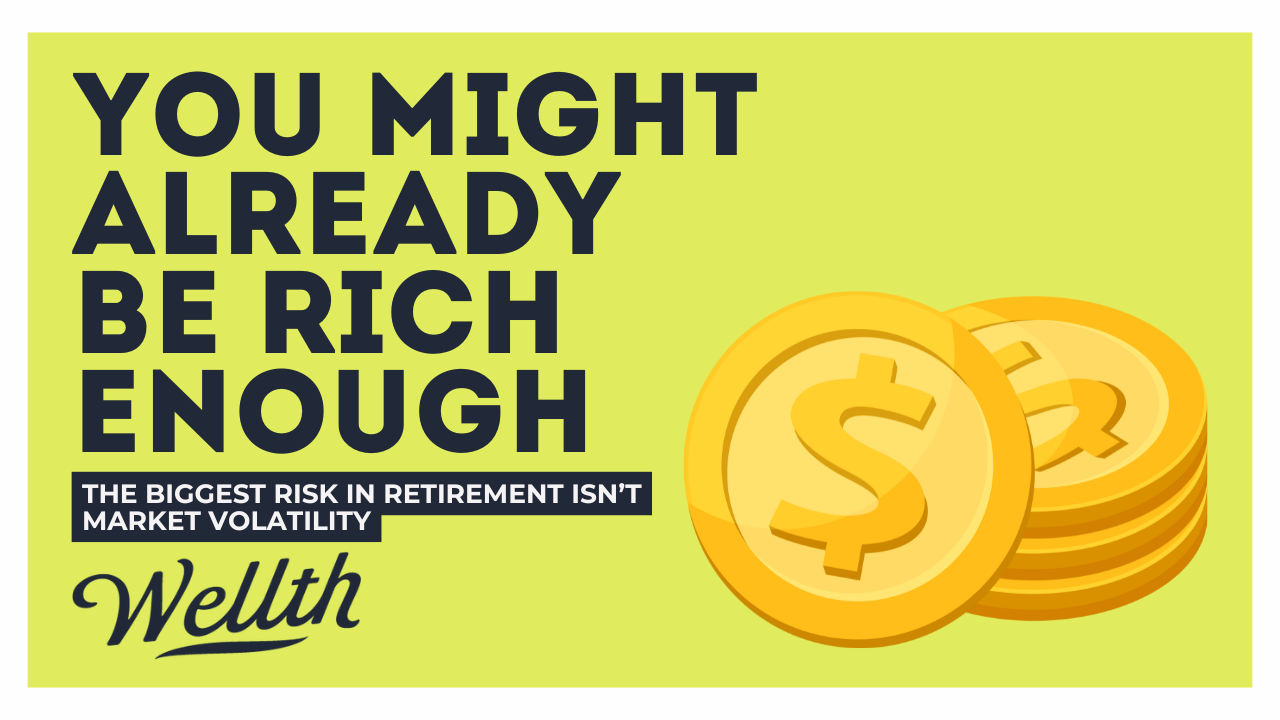Still Chasing Returns? You Might Already Be Rich Enough
The biggest risk in retirement isn’t market volatility—it’s playing the wrong game after you’ve already won
Most investors spend their working lives trying to answer one question: How do I build enough wealth to retire?
But very few stop to ask the second, more important one: What do I do once I get there?
It’s not a trick question. But it is a dangerous one—because the skills that get you to retirement aren’t always the same ones that help you stay retired. And in today’s environment, that mismatch is becoming a growing risk for investors who continue chasing growth long after they no longer need it.
Two Games. Only One Winner.
Think of your financial life in two chapters: accumulation and distribution.
In the accumulation phase, the rules are clear: grow your capital, reinvest your returns, and embrace volatility as a necessary companion to long-term compounding. You’re playing offense. You’re building.
But once you hit your number—once your portfolio can reasonably support your lifestyle through retirement—you’re in a different game. And the rules change.
You’re no longer trying to maximize your wealth. You’re trying to make sure it lasts. That means shifting from growth to durability, from risk-taking to risk-managing, from chasing upside to securing income.
The problem is, many investors don’t know when to switch games. And some never do.
The Freedom You Already Have—but Haven’t Claimed
At some point, the question shifts from “How much can I make?” to “How much do I need?” That’s the moment you’ve won. But the financial industry rarely tells you what that actually looks like—because endless accumulation makes for better headlines, and often, better fees.
Here’s what “enough” really means:
Your income needs are covered by your portfolio’s sustainable yield or withdrawal strategy.
You have a buffer for inflation, emergencies, and the unexpected.
You no longer need higher returns to maintain your lifestyle.
If that describes your situation, congratulations—you’ve already won the game. You can stop playing like you haven’t.
But for many, that’s the hardest part.
We’re hardwired to keep running. The adrenaline of watching markets, the identity we attach to “being a good investor,” the social pressure to keep outperforming—it’s difficult to turn that off. Even when continuing to chase performance could now put your retirement at risk.
The Hidden Cost of Playing the Wrong Game
When you stay in accumulation mode after crossing the finish line, you’re taking on risks you don’t need—and probably won’t be rewarded for.
The biggest of these is sequence of returns risk. If you suffer significant portfolio losses early in retirement, while also withdrawing income, it can set your entire plan back irreparably. You may not have the time or flexibility to recover. And the more aggressively your portfolio is positioned, the more exposed you are.
There’s also the psychological toll. When you’re no longer collecting a paycheck, every market drop feels personal. A 20% drawdown in your 40s is just noise. In your late 60s, it can trigger fear, second-guessing, or even panic selling.
Then there’s opportunity cost. By continuing to chase high returns, you may overlook more appropriate tools—like reliable dividend-payers, inflation-protected bonds, or income-generating real estate—that are better suited to your actual needs. The truth is, a “safe” 5% withdrawal from a resilient, income-focused portfolio may serve you far better than swinging for 12% returns and risking a sharp loss at the wrong time.
Why It’s So Hard to Let Go
Let’s be honest: this isn’t just a financial shift—it’s a psychological one.
Most successful investors built their wealth by being goal-driven, performance-minded, and disciplined. So the idea of not optimizing, of not pushing harder, feels wrong. It feels like giving up.
But it’s not.
Slowing down isn’t surrender. It’s strategy. It’s self-preservation. And it’s a recognition that the real purpose of money is to support your life—not consume it.
The market is no longer your opponent. It’s no longer your measure of success. In retirement, your success is measured in time, freedom, and the ability to sleep at night—not whether you beat the S&P.
And ironically, the investors who struggle most with this shift? They’re often the ones who’ve already won.
Stop Playing. Start Living.
If you’ve built a portfolio that can support your lifestyle, adjusted for inflation, with a margin of safety—you’re free.
You don’t need to chase. You don’t need to guess what the Fed will do. You don’t need to watch every tick of the market like it holds the key to your future.
Because it doesn’t.
What matters now is preservation, income stability, and the freedom to enjoy what you spent a lifetime building.
The goal isn’t to get rich forever. The goal is to stay free forever.
That’s the shift. That’s the game now.
So ask yourself: Am I still chasing something I already have?
If the answer is yes, it might be time to stop playing—and start living.
Coming Up Next:
In the next article, we’ll explore what to do after you stop chasing.
Because knowing you’ve already won is just the first step.
The next is building a portfolio—and a lifestyle—that keeps you free.
We’ll look at what the “right game” actually looks like in retirement, how to build resilient income, and how to redefine winning on your own terms.
Hint: It’s not about higher returns. It’s about building a life that doesn’t depend on them.
Disclaimer: This analysis is for informational purposes only and does not constitute financial advice. Investors should conduct their own due diligence and consult with a financial advisor before making investment decisions.


